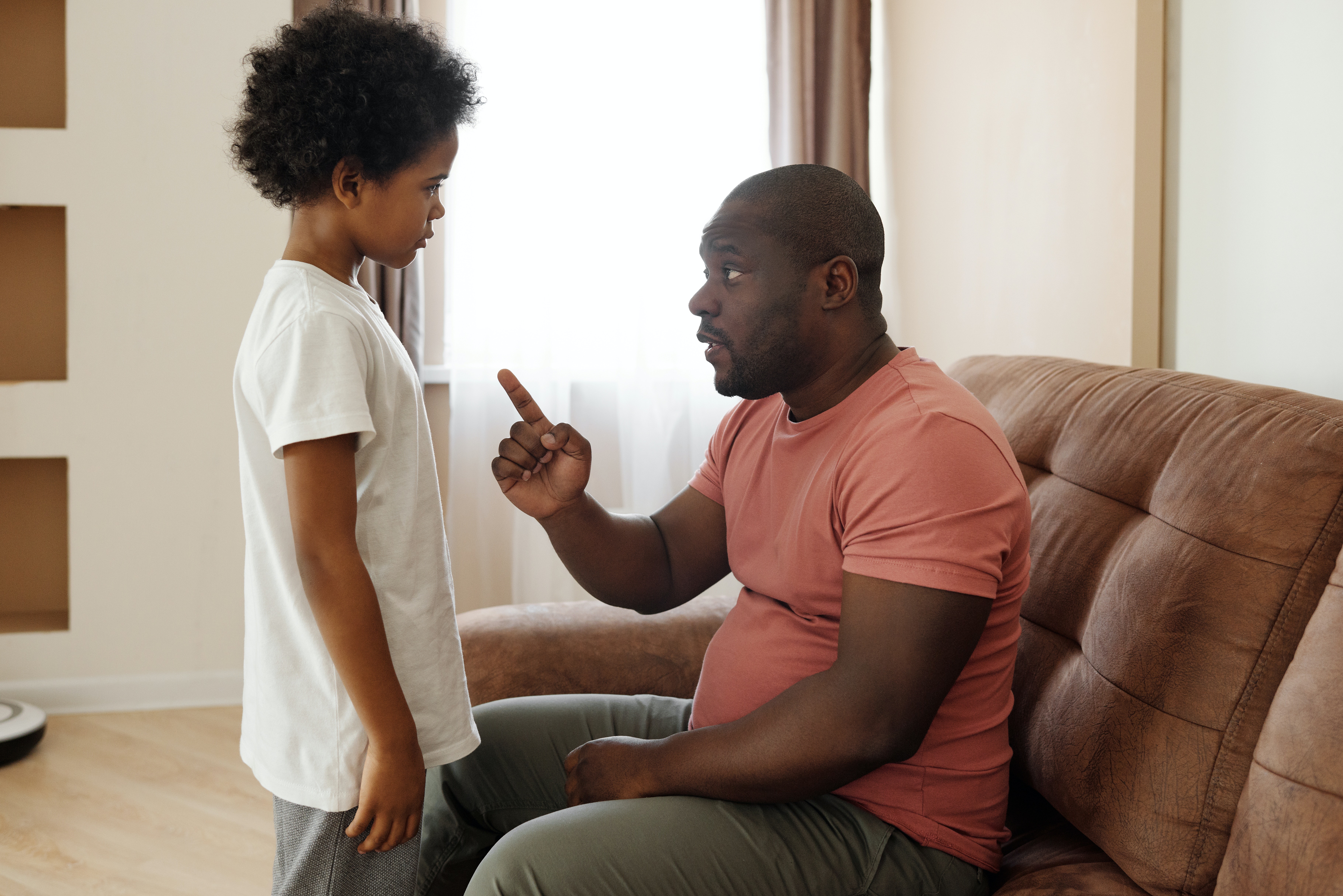
As a parent, you need to be strict at times to ensure that your children are safe and sound. You can’t be lenient about them using the seatbelt while you’re driving on the highway, for instance, or wearing a bike helmet. You can’t let your children run around with scissors in their hands or be cruel to their friends and siblings.
However, not every occasion calls for such rigidity with the rules and boundaries. On occasion, you need to be flexible. If you’re not, you’ve likely adopted the authoritarian parenting style.
Authoritarian parenting is one of the most easily recognizable parenting styles wherein the roles of the parent and the child are clearly defined. The parent is the authority figure who demands respect, while the child is there to obey without questions.
Find out more about authoritarian parenting styles, their characteristics, and how they reflect on the children.
In this article
- What Is the Authoritarian Parenting Style?
- How Authoritarian Parenting Stands Out From Other Styles
- Characteristics of Authoritarian Parenting
- Highly Critical Approaches
- No Negotiation
- Mistrusting Children
- No Patience
- Authoritative vs authoritarian
- Punishments Without Explanation
- No Nurturing or Warmth
- Too Many Rules
- Authoritarian Parenting Effects on Children

Let’s start with the basics – what is authoritarian parenting? The name itself is pretty telling. Authoritarian parents act as autocrats. They’re the ones responsible for making and enforcing rules, while the children’s task is simply to listen, obey, and stay out of trouble.
Children don’t need to know why the rules have been enforced. They don’t need to understand or agree to them – they just have to follow them.
The simplest way to define authoritarian parenting is by referring to it as “traditional” parenting. An example of authoritarian parenting would be all those parents who don’t let their kids talk back, impose strict curfews and bedtimes, and respond to their kids’ protests with, “Because I said so.” Everyone knows (or has had) traditional parents like those.
The authoritarian parenting style focuses on rules, discipline, and punishment. As a general rule of thumb, that leaves little room for warmth and support, making the relationship between authoritarian parents and their children somewhat distant.

Of course, the authoritarian parenting style isn’t the only parenting type. Psychologists recognize four unique styles of parenting, one being the authoritarian style and the others authoritative, permissive, and neglectful.
Like the authoritarian style, the authoritative style has parents focusing on rules and boundaries. However, while authoritarian parents have no flexibility regarding rules and don’t allow their children to have any say in them, authoritative ones try to keep the children involved.
All the rules and the consequences of breaking them are discussed in detail, and the children are allowed to offer their own feedback.
The polar opposite of the authoritarian style is the permissive style of parenting. As the name suggests, permissive parents allow their children to do almost anything they want. Some rules and boundaries might exist, but they have no real consequences if broken.
Finally, neglectful parents stay as uninvolved with their children as they can be. They might have some rules they think should be followed, but they don’t care much whether they’re followed or broken.
As a general rule, few parents will fit clearly into a single parenting style. Depending on the circumstances, they might choose authoritative vs authoritarian parenting. At times, they might be neglectful and, on occasion, permissive. However, almost all parents tend to strongly prefer at least one of these parenting styles that they turn to most frequently.

Just like every child, every parent is different and unique. Still, there are some authoritarian parenting characteristics that most parents who adopt this style share.
Most authoritarian parents tend to be critical, rather than shaming their children and micromanaging them rather than praising or offering positive support.
Naturally, they don’t see this as a negative characteristic but rather as an approach to correcting mistakes. Unfortunately, this critical approach tends to be more harmful than helpful to children.
As mentioned, in the authoritarian parenting style, the parent is the one who holds all the power and makes all the rules. There’s no room for negotiations or discussions. Even when it comes to consequences or punishments for bad behavior, the child isn’t allowed to offer explanations or try to negotiate a lesser punishment.
One of the main reasons for such strict behavior with authoritarian parents is that they mistrust their children. They can’t be trusted to make their own decisions (at least not good decisions). They can’t be trusted to learn from the natural consequences of their actions.
Therefore, authoritarian parents tend to hover over their children, micromanage virtually every aspect of their lives, and give them little choice or freedom.
Despite authoritarian parents imposing rules and punishments without explanations, they still expect their children to “know better”. They have little patience for any rule-breaking or misbehavior, even when the child doesn’t know they’ve done anything bad.
Authoritarian parents take no time to discuss the causes of bad behaviors, offer creative solutions, or have open-hearted discussions about them with their children.
Both authoritarian and authoritative parents like to have rules and boundaries that are respected, and both have clear consequences for bad behaviors. However, where the authoritarian parent simply enforces rules and punishments, the authoritative one first discusses them with the child.
Authoritative parents encourage their children to provide input and be involved in rule-making. Instead of handing out punishments, they explain to their children why the consequences of bad behavior are necessary and how they can be avoided.
Since authoritarian parents have little patience for their children’s perceived misbehaviors, it comes as no surprise that they have no patience for explaining any punishments or consequences.
One of the clearest authoritarian parenting examples is when parents ground their children “until further notice”. As far as the child is concerned, they could be grounded for two days or two months. Moreover, they have no idea what kind of punishment they could receive for different types of misbehavior.
Getting home five minutes after curfew could mean getting grounded for two weeks, having their phone taken away, canceling an important event, or anything in between. It’s on the parent to know that and the child to simply obey.
Most authoritarian parents follow the motto: “Children should be seen and not heard.” They focus more on imposing rules and creating discipline rather than spending quality time with their children. Hence, these parents aren’t often warm or nurturing.
Instead, many tend to yell, nag, and get into arguments rather than offering emotional support to their children.
It’s rare for an authoritarian parent to have just a few simple rules their kids must follow. More often than not, there are rules for absolutely everything.
Instead of using parental control apps like FamiSafe to keep their children safe online, for example, they would use them to impose strict screen time limits and monitor everything their child does on their phone.
They would oversee their children when interacting with friends, have a say in which extracurricular activities their kids can enjoy, have strict guidelines on how children should behave in public, and more.

While learning to respect rules and boundaries is vital for every child, having exceptionally strict and emotionally distant parents can have bad consequences. The effects of authoritarian parenting can range from developing anxiety issues to turning to aggressive behavior.
Most children who grow up in authoritarian homes tend to develop anxiety issues early on and are more likely to suffer from depression. They feel like they have little control over their lives, accepting their fate without trying to improve it, and never know when there could be a punishment for something they did or didn’t do.
Most authoritarian parents have exceptionally high expectations of their children. Any mistake or failure is swiftly punished, so children learn to be terrified of failure. Whether they perform poorly in school, sports, or a fun board game, they cannot take failure well.
Very often, children see their authoritarian parents as bullies who cannot be reasoned with. On the one hand, they learn that bullying someone “weaker” is acceptable behavior since that’s what their parents are doing. On the other hand, they don’t learn to process their emotions in a healthy way, learning to lash out whenever they have some breathing room.
Usually, such children are more likely to become aggressive and develop more rebellious personalities in their teens.
Children can only learn good social skills if their parents create nurturing, supportive environments and spend plenty of quality time with them when they’re still young. Since authoritarian parents are often cold and distant, children could develop poor social skills that make it more difficult to form relationships, make friends, and connect with others.
Children with authoritarian parents often have unusually low self-esteem because they are unable to make their own choices, learn from natural consequences, and freely explore the world. They’ve learned to fear failure and expect punishment, that others would shame, nag, and blame them for poor choices, so they tend to be shy and withdrawn, relying on others for a confidence boost.
Considering all the harmful effects of the authoritarian parenting style, it’s easy to tell that this isn’t the style you should choose. Children need rules and boundaries but also love, support, and freedom to learn from their mistakes, explore the world, and express themselves. They need a positive environment in which they can thrive.
So, as a general rule of thumb, choosing the authoritative rather than the authoritarian parenting style is often better for the parent and the child.
